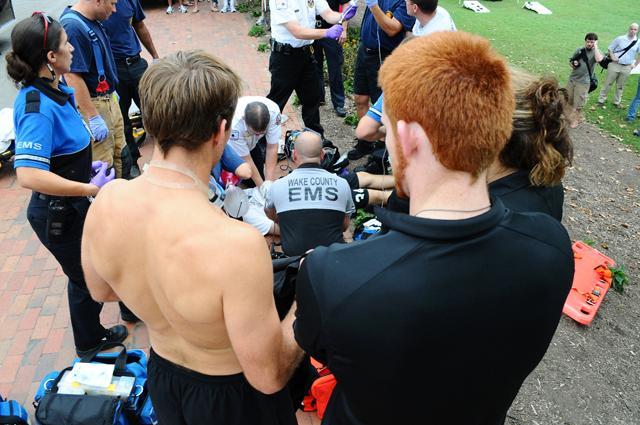When Spencer Shell, then a junior in political science, collapsed on Harris Field while jogging last fall, Matthew Cross, a junior in business administration, was one of the students to aid in his resuscitation.
Having worked as a firefighter and been certified in CPR, he was well equipped to help save Shell’s life, but the same cannot be said for all N.C . State students. A class that began on campus this semester is seeking to change that.
“At the end of the course, if you pass the exam and class, you can take the North Carolina EMT Basic test and become certified to work as a paramedic,” Cross said. “Imagine if we had thirty or more students who take this class and get certified, they would be trained to handle emergencies that might happen in class.”
The course, PEH /BIO 300, is currently taught by Wake County paramedic chief Gene Lambert, and is a balance of textbook use, lecture and skill training labs. While Cross said the reading load was large, he said his favorite part of class is the skills lab where students get to put their studying to use on one another.
The four-credit course may not fall within most major requirements, but Cross, who is currently studying dentistry, says that it’s still well worth it.
“If you pass the class and the state exam, you’d be able to work for the fire department or EMS and actually go in the field as a paramedic,” Cross said.
Lambert, who comes to campus from his Wake County EMS department to teach the course, believes emergency training for students would make students and faculty feel safer on campus.
“Emergencies and sickness happen every day, and the difference between life and death can often be measured in seconds and minutes. Students having the ability to be on scene with early intervention can make a difference in someone’s outcome,” Lambert said.
The class isn’t what students necessarily expect, Lambert said.
“With 40 chapters, each about a different topic, it’s a broad class that keeps students interested, but it’s also a lot more in depth than the basic classes they’ve taken before,” Lambert said.
Alissa Moody, a senior in human biology, is glad that she enrolled in this course, specifically because of how it can apply to her previous studies.
“I took a class on brain and spinal cord injury a while ago and learned about some of the new research they’re doing to change the way response to those injuries is handled. This EMT course is really a great way to implement some of those changes,” Moody said. “Students who know about research from other areas can use EMT training to help change the face of medicine.”
While this semester’s students have yet to take their final, most of the class is expected to pass and sit for the North Carolina EMT exam. Cross, who is excited to get another certification in emergency response, says that this course could really change the way emergencies are handled on campus.
“We want to implement a system that would send a text alert to the students who are registered EMT Basics on campus in the event of an emergency,” Cross said. “That way, if one of those students is near the emergency location, they could assist and get all the necessary information while waiting for an ambulance.”








